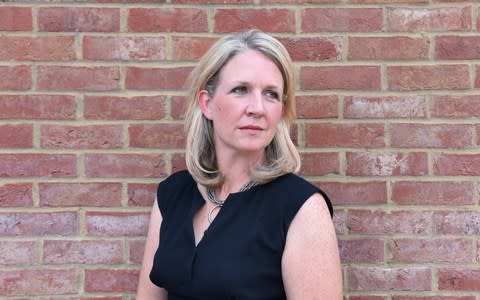How your high street manicure or hair cut could be funding modern slavery

It was evident at first look that something wasn't right with Bath's Deluxe Nails. A stone's throw from the historic Roman Baths, the salon was staffed by two young Vietnamese girls when Detective Inspector Charlotte Tucker entered on a February morning in 2016 with her colleagues from Avon and Somerset police. They were running a "day of action" in search of people who may have been the victim of modern slavery. The girls, who cannot be named for legal reasons, caught Tucker's attention.
They were doing two clients' nails, under the supervision of an older, male member of staff. All the signs of modern slavery were there: they looked vulnerable, really tired and didn't speak any English.
"It was really obvious there was an issue," says Tucker. "We had a stroke of luck as the proprietor wasn't there when we arrived." This gave them a small window in which to find out, through a translator, that at least one of the girls had arrived in the UK on the back of a lorry.
Then salon manager Thu Huong Nguyen, known as Jenny, returned from dropping her 16-year-old daughter at school. She was polite and offered to help; but, thinking the police couldn't understand, she turned to the girls and, in clipped Vietnamese, said, "Have you told them what I told them to tell you? Make sure you're telling the police the right story."
So began a two-year investigation that involved six police forces. including the National Crime Agency; 14 potential victims; visits to more than 280 businesses; and 97 arrests. At the beginning of this year, Jenny, 49, and two others became the first people to be prosecuted in the UK for modern slavery involving children. The case was followed in The Prosecutors, a BBC documentary series.
"She had a 15-year-old daughter whom she had taken to school after helping her photocopy something for a project," says Tucker. "Yet, it turned out, she had these similar-aged teen girls working 60-hour weeks with her for very little or no recompense."

Passed into law in 2015, the Modern Slavery Act covers forced or compulsory labour, sexual exploitation, domestic servitude, organ harvesting and human trafficking. The exact number of victims of such crimes in the UK is unclear, but the Home Office estimates as many as 13,000 people could be affected. Separate research from Freedom United, which includes new forms of slavery such as child drug-runners, suggests this number could, in fact, be 136,000.
Victims may be put to work in nail salons, car washes, clothing factories, cannabis farms or the cleaning industry. An emerging area of concern is also traditional Turkish barber shops, where the growing male grooming industry has led to exploitation.
"If you’re in a barber's and, when another customer arrives, a tired or disheveled barber comes downstairs to start working on them, there could be a problem," says Tucker. "There are barber shops setting up now where people live above the shop and customers pay in cash. Owners are looking to exploit workers and make money."
While there is "no typical victim of slavery", according to charity Unseen, gangs that run such outfits are known to have links with countries including Vietnam, Albania and Romania. The Vietnamese gangs are often associated with nail bars and cannabis farms. Funds from the drug trade are often laundered through the legitimate-seeming salons.
The common theme, Tucker says, is how vulnerable victims are. "This was one of the most difficult cases I've worked on. But it was really rewarding to get the right result for people who are so indoctrinated and so vulnerable."

One of the difficulties in policing modern slavery is that, as with domestic abuse, victims are often emotionally – as well as financially – connected to their abusers. When Tucker removed the victims from Jenny's care, they were upset and one burst into tears; all they had known in the UK was living and working with her. This form of Stockholm syndrome can be a barrier to prosecution, as victims are wary of sharing their stories, which are vital evidence.
"They don't see themselves as victims and weren't necessarily unhappy about how they were living," says Tucker. "They were allowed to walk to the chemist and, on the way to work in Jenny's car, they could have jumped out at traffic lights and run away.
"But they couldn't because they had nowhere to go. They relied on the organised crime group." Jenny's victims in fact ran away from foster care numerous times and back into the grip of their abusers.
"They’re not locked away or in chains, but are hidden in plain sight," says Tucker. "It’s incumbent on everyone using those services to try and spot the signs of modern slavery."
Tucker hopes her investigation, and others, will raise awareness of the problem. She urges people who use cheap services such as nail bars or car washes to stop and think, do the staff look frightened, tired or vulnerable? Can they speak any English? How old do they appear to be?
"Cheap nail bars are everywhere, they've popped up on every high street," she says. "If you think you're getting a bargain, are only allowed to pay in cash and the staff can't speak English, it's probably too good to be true. I personally wouldn't be getting my nails done there."
She says the public should adopt a Think 25-style policy when making sure their manicure is ethical. If a nail bar worker looks like they are under-18, exploitation could be occurring.
"Children should be in school until they are 16 and then there will be a period of training at college," she says. "Certainly, they shouldn’t be working at a nail bar."

The public should ask the technician their age if they suspect them to be under 18. And when picking a barber's or nail salon, she advises customers to look for stores with a regular payment system, where staff look happy and relaxed and have a good relationship with managers.
The police hope members of the public will start raising the alarm by reporting it to 101 if they notice something suspicious. "There's no harm in putting it through, and it all adds to intelligence," she says.
Jenny is a British national who lived in the UK legally and whose children were born and educated here. She initially came to police attention in 2014, when they found a teenage Vietnamese girl and suspected victim working with her at a different premises, but she wasn't prosecuted until this year.
"That's indicative of the old system," says Tucker. "The legislation in 2015 focused people's minds and quite rightly pushed the agenda forward."
Even with the new legislation, it isn't easy to prosecute human trafficking and forced labour. Tucker is pleased with the three convictions in the Bath case, but says there is more work to be done. The gang runs far wider and deeper than those two salons. Not only does it stretch across Scotland and the north east of England, it is also spans countries.
"It's huge. People are such an easy commodity to move around the country," says Tucker. "The network goes across to Vietnam. And a lot of victims say they’ve come into the UK from France, so no doubt there are tentacles across Europe.
"This is a pernicious, despicable crime designed to make money out of someone’s vulnerability. We need the public’s help."
The Prosecutors: Modern Day Slavery is available on BBC iPlayer

